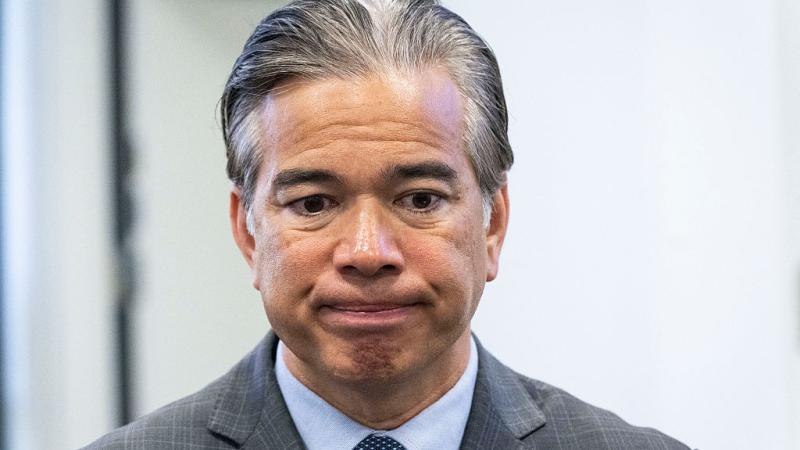Documents show citizens' concerns ignored as Biden administration moves forward with offshore wind
Government knows what better for you? Multiple groups have voiced objections to Biden’s offshore wind energy plan regarding marine wildlife, historic sites, tourism and fishing. Many say the Department of the Interior has not factored in anything they have to say on these matters.
The beaches along the southern coast of Nantucket, Massachusetts, were shut down last week when a offshore wind turbine blade disintegrated. Residents were picking up pieces of green and white foam, along with larger pieces of fiberglass off the sand, the Nantucket Current reported.
The debris came from the Vineyard Wind, which in January became the second offshore wind project in the U.S. to deliver power. The debris incident will likely add to the growing list of concerns about the impacts of President Joe Biden’s plans to blanket the East Coast with wind turbines exceeding the height of the Eiffel Tower and with blades longer than football fields.
Multiple groups from both sides of the political divide have voiced objections to Biden’s plan over the impacts to the viewshed, marine wildlife, historic sites, tourism and fishing. While their concerns vary, many say the Department of the Interior (DOI) has not appeared to factor in anything they have to say on these matters.
"We’ve reached out in various ways, and it doesn’t appear our concerns have been heard,” Dr. Bob Stern, a volunteer with Save LBI, told Just the News.
Pushing forward
Government watchdog Protect the Public’s Trust (PPT) obtained records it says demonstrate that the DOI ignored the input from multiple municipalities, Native American tribal groups and other federal agencies in permitting the South Fork Wind project off the coast of Rhode Island.
“You could even call it an arrogance about the decision making and pushing forward with offshore wind projects,” PPT Director Michael Chamberlain told Just the News.
Attorneys representing the interests of Rhode Island towns and historic preservation societies impacted by the South Fork Wind project sent a 21-page letter to the Bureau of Ocean Energy Management (BOEM) criticizing the DOI’s failure to address the concerns of Tribal leaders as required by law. They say the DOI consultations were largely limited to industry officials.
“We have NEVER seen a more dysfunctional process than the one BOEM has imposed on historic communities and Tribal Nations for the launch of the offshore wind industry in the United States. At every juncture, BOEM has failed to listen to or consider the concerns of historic communities and Tribal Nations,” the letter states.
The letter goes on to say that the representatives of these groups are “disappointed, but not surprised” that BOEM showed no interest in holding more meetings to discuss the visual impacts of the project on historic sites around Block Island, such as the Southeast Lighthouse, which is a National Historic Landmark.
“We appreciate that at least BOEM is no longer pretending to care about our clients’ concerns and is finally admitting that the agency just doesn’t want to hear what impacted communities have to say. Truly, this permitting review has become a theater of the absurd,” the firm wrote.
Protect the Public’s Trust also obtained emails that show BOEM officials who were in charge of permitting the development moved forward despite being aware of the concerns.
“These organizations have legitimate concerns about the impacts on the community and on the historical areas, and they were either ignored or disregarded or just not really taken into account,” Chamberlain said.
"Operational noise"
Concerning the debris covering the Nantucket beach from the Vineyard Wind farm, Avangrid and Copenhagen Infrastructure Partners, which own the project, issued a statement saying that a blade became detached from a turbine and crews are continuing cleanup efforts.
“Current weather conditions create a difficult working environment. Despite these challenging weather conditions, a fleet of vessels remains at sea managing the situation and working to remove bulk debris,” the companies said.
The debris in Nantucket from the Vineyard Wind farm threatens marine life. According to the National Ocean and Atmospheric Administration (NOAA), species of marine mammals have been confirmed to eat marine debris.
“We do know that because baleen whales filter extremely large amounts of water while feeding, they may get plastic debris entangled in their baleen plates,” NOAA states on its website.
Various groups have raised concerns that the endangered North Atlantic Right Whale, which is a baleen whale, may be driven to extinction as a result of the impacts of Biden’s offshore wind projects.
Save LBI volunteer Dr. Bob Stern is an engineer who previously managed the office in the U.S Department of Energy that oversaw the protection of the environment as it relates to energy projects. Save LBI works to save Long Beach Island from what they say are the destructive impacts of the proposed Atlantic Shores offshore wind project and others,
Stern said that they’ve communicated to BOEM through many commenting opportunities about the research they’ve done into the cumulative impact of multiple projects off the shores of New Jersey. The operational noise, as well as the construction, from these large towers, he said, is going to cause serious problems for the endangered whales.
“You basically don't leave the whale anywhere to migrate without encountering that noise,” Stern said. He said the federal agency has been unresponsive to their concerns.
“They recently issued a biological opinion under the Endangered Species Act, and they completely ignore the operational noise problem. There was virtually nothing in there about operational noise,” Stern said.
"Unreasonable" timeline
It’s not just members of the impacted communities that the DOI appears to blow off, but also other federal agencies. During the permitting process for Vineyard Wind in 2022, the DOI delivered to the National Marine Fisheries Service (NMFS), which is charged with assessing the impacts of offshore projects on sea life, the construction and operation plan for the project just four days before the construction was to start.
Louis Chiarella, assistant regional administrator for habitat conservation for NMFS, wrote a letter to BOEM objecting to the short timeframe given the service to review the plan.
“We consider this to be an unreasonable timeline for review and comment,” Chiarella wrote.
He goes on to recommend that BOEM and NMFS staff have a “more robust discussion” to ensure standards are being met. Chiarella stated that issues the NMFS has raised were also occurring with the South Fork Project in Rhode Island.
“We also need to ensure that NMFS staff are not only getting the information needed to respond to these reviews, but also provided sufficient time to do so,” Chiarella wrote.
Chamberlain pointed out that while the wind industry has been around for a while, these enormous offshore wind projects have never been done along the U.S. East Coast.
“It's not as though they have a decade's long history like oil exploration offshore in the Gulf to go back on,” he said.
For now, the DOI appears to want to build the wind farms now and find out what the impacts will be later.
Just the News reached out to the Interior Department for comment and didn’t receive a response.
The Facts Inside Our Reporter's Notebook
Links
- the Nantucket Current reported
- became the second offshore wind project
- Joe Bidenâs plans to blanket the East Coast
- Save LBI
- Protect the Public’s Trust
- sent a 21-page letter
- obtained emails
- debris covering the Nantucket beach
- Vineyard Wind farm
- issued a statement
- confirmed to eat marine debris
- baleen
- Atlantic Shores offshore wind project
- wrote a letter to BOEM















